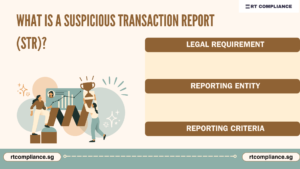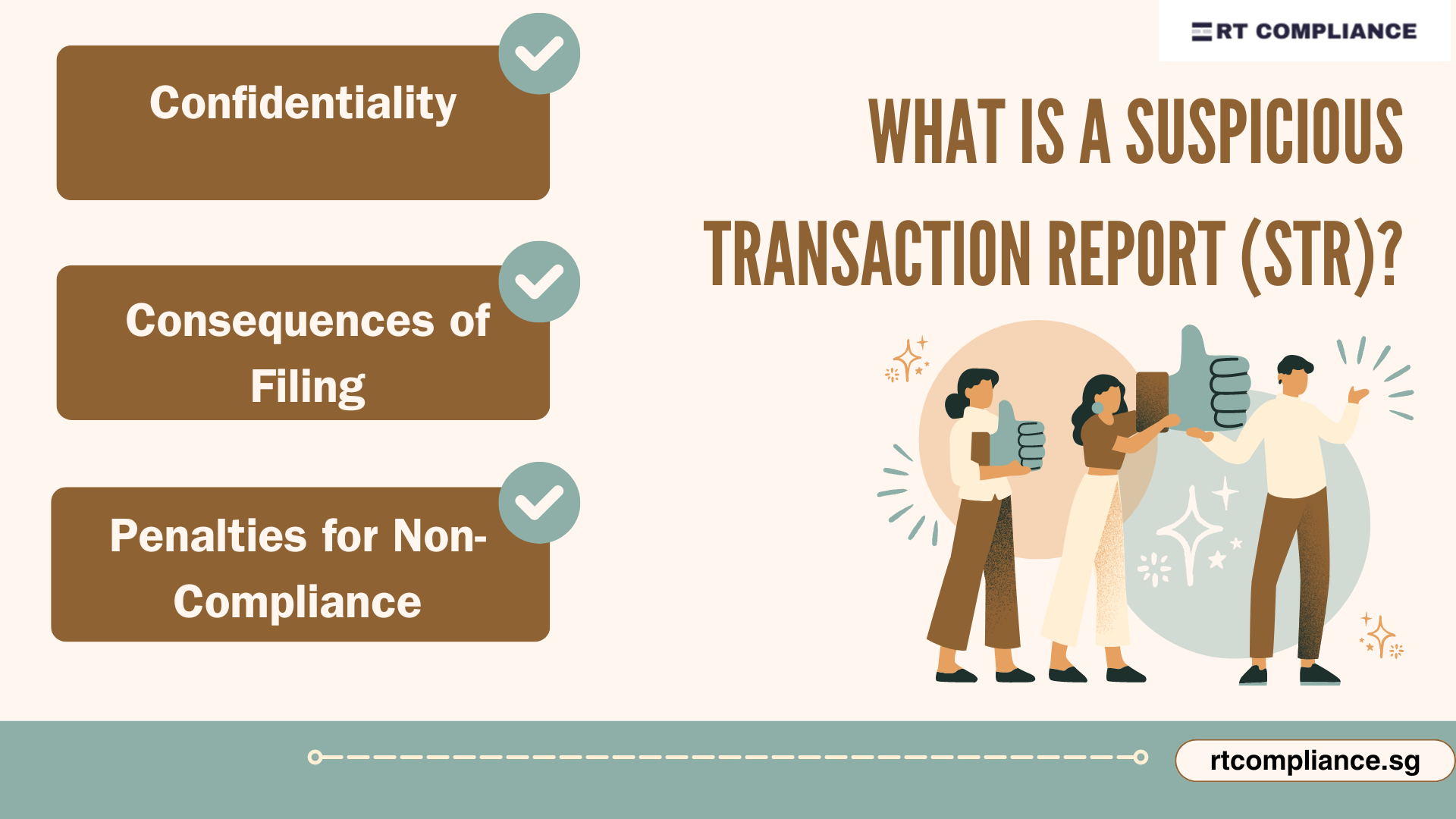What is a Suspicious Transaction Report (STR) in Singapore? | AML and CFT Compliance Guide
A Suspicious Transaction Reports is a mandatory reporting requirement in Singapore’s regulatory framework, particularly under its robust AML (Anti-Money Laundering) and CFT (Counter-Terrorism Financing) efforts. STR Singapore refers to the formal process of flagging transactions that may involve money laundering, terrorism financing, fraud, or other illicit activity.
This procedure supports the work of the Suspicious Transaction Reporting Office (STRO Singapore) and forms a critical part of compliance with Singapore’s CDSA (Corruption, Drug Trafficking and Other Serious Crimes (Confiscation of Benefits) Act) and TSOFA (Terrorism (Suppression of Financing) Act).
Both financial institutions and individuals have an obligation to file STRs in Singapore if there is a reason to suspect criminal activity — even if the activity is not yet proven. This enhances the country’s financial integrity and helps protect against abuse by criminals and terrorist networks.
If you’re wondering who needs to file STR in Singapore, the answer is: anyone who notices suspicious activity. This includes banks, law firms, accountants, and even private citizens.
Who is Obligated to File an STR in Singapore?
Under Singapore’s strict AML/CFT rules, many businesses and people have to report suspicious transactions or money-related activities if they think it might be related to money laundering, terrorism financing, or other kinds of financial crimes. This obligation is mainly guided by the Corruption, Drug Trafficking and Other Serious Crimes (Confiscation of Benefits) Act in Singapore (CDSA Singapore) and the Terrorism (Suppression of Financing) Act (TSOFA Singapore).
The obligation affects many kinds of people and professionals, such as:
– Banks, remittance firms, and insurers are all included in this group.
– Licensed Fund Management Companies (LFMCs) and other regulated financial service providers are the main categories of financial service providers operating in Singapore.
– Designated non-financial businesses and professions (DNFBPs) such as:
- Lawyers and legal practitioners
- Public accountants
- Company service providers
- Real estate agents
- Dealers who sell precious stones and metals.
– Any person who, while doing their job or carrying out business, sees or hears about an action or reason that seems odd or strange needs to report it to the officials.
Even ordinary people in Singapore might need to make a report if they think a transaction they saw or heard about might be linked to terrorism financing. All reports should go to the Suspicious Transaction Reporting Office (STRO Singapore), and it’s usually best to send them in using the SONAR online service.
Failing to file an STR when you are supposed to could lead to you facing legal trouble. Therefore, it is important for people who work in or with Singapore’s financial or professional world to know who should file an STR.
What Constitutes a “Suspicious Transaction”?
If a financial trade raises suspicions about the truthfulness of the deal or who is involved, this is called a suspicious transaction. It is required by law in Singapore to submit a Suspicious Transaction Report, as set out by the Corruption, Drug Trafficking and Other Serious Crimes (Confiscation of Benefits) Act (CDSA) and the Terrorism (Suppression of Financing) Act (TSOFA). The role of STRO is to receive reports on suspicious transactions and review them.
When a transaction doesn’t seem to have an obvious reason or if it is different from what a customer usually does, it may be suspicious. Large or repeated cash deposits, opening accounts in tax havens, and hiding or evading answers by clients are some of the typical signs of money laundering in Singapore.
Other red flags include:
- ✔️ Signs of increased use of abandoned accounts.
- ✔️ Third-party transactions without explanation.
- ✔️ A person caught using fake documents or forms of ID that cannot be checked.
It should be emphasized that suspicion is different from having facts or evidence. If you suspect that money laundering, terrorism financing, or other financial crimes could be involved in a transaction, the business or professional has to submit an STR in Singapore.
If a company does not comply with these regulations, it could face lawsuits and more regulation. It is crucial for financial institutions and professionals to know what a suspicious transaction consists of in Singapore to follow AML/CFT laws and ensure the security of the financial system.
Common Red Flags for STR Filing in Singapore
Being able to identify suspicious activity is necessary to comply with your obligations under the CDSA and TSOFA in Singapore. When it comes to money laundering and terrorism, businesses must carefully watch for related signs because not reporting could end up with major penalties.
Some common red flags include:
- ✔️ Unusually large, complicated, or unexpected transactions for a customer.
- ✔️ Breaking up large sums of cash to fall below the reporting rules.
- ✔️ People often refuse to show a proper ID or explain where the funds used in a transaction come from.
- ✔️ Registering a firm in a place with strong money laundering risk, without any real reason for doing so.
- ✔️ If a third party takes part in repaying loans quickly or if a large amount of money is involved.
An unlogical reason for a transaction and these warning signs could mean it is necessary to file a Suspicious Transaction Report (STR) in Singapore. Doing so helps us maintain security and compliance with the necessary regulations to combat money laundering and terrorist financing.
Focus on expressing doubt, not on trying to prove they are guilty. If you aren’t sure, file an STR.
How to File a Suspicious Transaction Report (STR) in Singapore
In Singapore, the Suspicious Transaction Reporting Office (STRO) is the designated body that handles STR submissions. Businesses and individuals can file reports using the SONAR system — a secure digital platform that simplifies the process of filing STRs in Singapore.
This system also supports other forms, including Form NP 759 for Cash Transaction Reports (CTRs) and Form NP 728 for Cross Border Cash Movement Reports (CMRs). Using SONAR improves the speed and confidentiality of reporting suspicious transactions in Singapore.
Businesses are strongly encouraged to train employees to detect red flags and fulfill STR reporting requirements in Singapore. Whether you’re in finance, law, or other regulated industries, submitting an STR is a legal duty and a best practice in protecting Singapore’s reputation.
- A new form to file STRs
- Form NP 759 to file CTRs
- Form NP 728 to file CMRs
The efforts seem to be paying off in Singapore. Between 2014 and 2017, STRs increased from 29082 to 35471. The reporting has helped by offering the enforcement agencies information, patterns, and intelligence. In 2018, the figures dropped to 32,660, which was an incredible drop.
Conclusion
Clearly, STRs are essential for the sanity of the financial sector lest it surrenders to illegal activities. Whether it is money laundering, fraud, drugs, or terrorism financing, once Singapore’s reputation is ruined, everyone, including the innocent business people, will suffer. That’s why you should take it upon yourself to file one if such transactions happen or are about to at all times.






